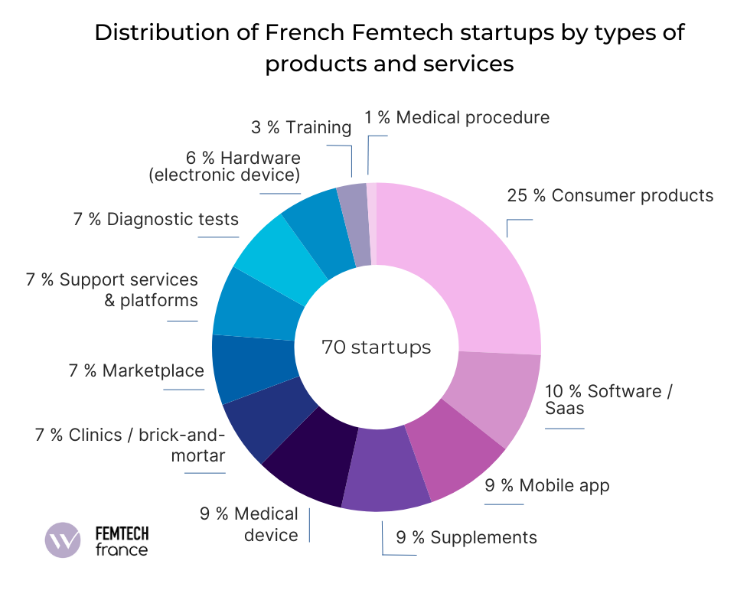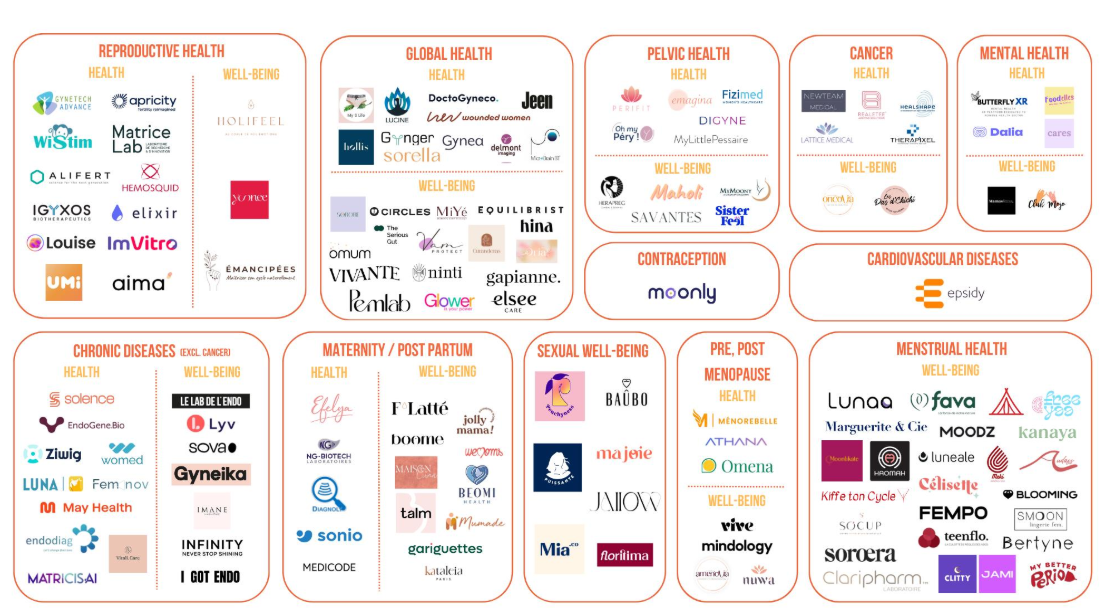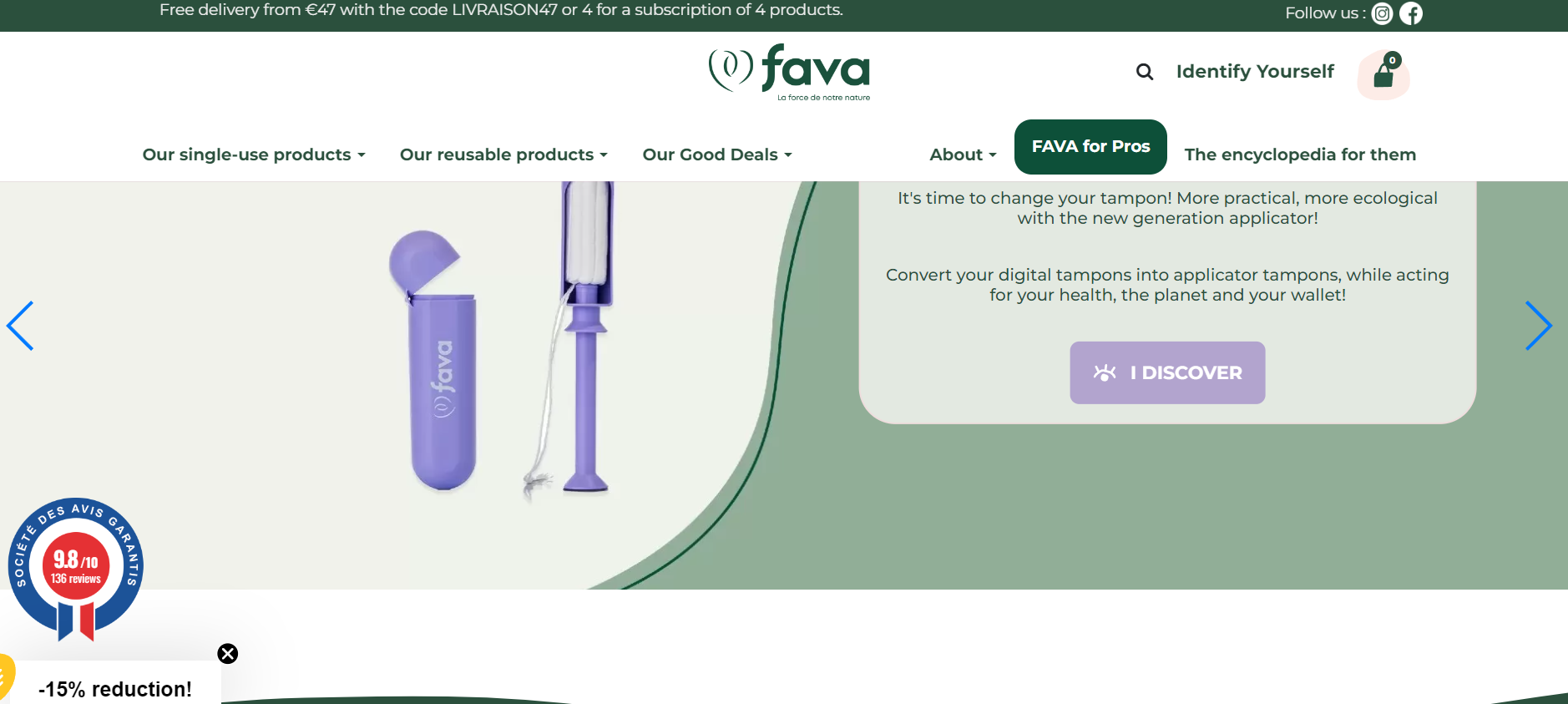Table of Contents
ToggleAn Overview of France’s Femtech Market
Femtech Startups are revolutionizing the healthcare industry, by addressing women’s health needs through innovative software. For many of them, the founding team consists of female patients who have previously faced negative healthcare experiences, seeking to raise awareness on underrepresented female issues by collaborating with experts in the field. France’s Femtech Startup scene has been growing exponentially in recent years. In 2024, 94% of French femtechs were (co) founded by women, compared to 20% in 2022.
While the most popular sector is “Healthcare”, the Femtech scene encompasses different segments, such as menstrual health, global health, chronic pathologies & pelvic health. However, some important issues are still not addressed to the same extent, including menopause management and cardiovascular diseases – which are quite prevalent among French women!

According to the 2024 Femtech France Barometer, when it comes to product distribution, most French femtechs focus on new software services, diagnostic tests and medical devices while we notice a considerable percentage of innovative consumer goods & products in the wellness sector.

Most of the femtechs featured in France’s Barometer report follow the typical B2C & B2B business models while a small percentage operates on a unique B2B2C (company to company to consumer) model. Out of the 94% surveyed companies, 87% operate mainly in France, followed by other European countries, America & North Africa. The combined sales of French Femtechs hit an impressive 24,8 million record by 2023 which is currently growing at even bigger rates.
The Leading Femtech Startup in France
The French Femtech ecosystem involves a great range of pioneering companies that specialize in women’s healthcare. Most of them are based in Paris’s greater metro area, home to more than 12000 French startups. According to Femtech France, the leading femtech start-up is Perifit which is revolutionizing the field of female reproductive health.

Perifit offers an innovative device that combines technology with physical therapy to improve pelvic floor strength. The Perifit device is a smart Kegel exerciser that connects to a mobile app. Users engage in video game-like exercises controlled by the Kegel movements, making the training enjoyable and engaging. It provides real-time feedback to ensure that exercises are done correctly and effectively.
Perifit is only one of the impressive French Femtechs, aiming to improve women’s lives everywhere with technology-driven solutions. Their contributions not only enhance individual health outcomes but also push the boundaries of traditional healthcare practices, introducing real-time data monitoring and AI technologies.
You can find more about the top Femtech Startups in Paris on our blog.
But, that’s not all! Here’s an overview of 140 (yes, you heard right!) femtechs you should keep on your radar, organized by sector:

Major Partnerships
Besides Femtech Startups, collaboration with healthcare organizations and experts such as hospitals, healthcare professionals and pharmaceutical laboratories are also contributing to the vast growth of the sector.
These collaborations facilitate Research & Development processes (R&D) such as product design, testing and market research, while healthcare experts provide the medical “know-how” by setting up clinical trials, data collection from patients and case studies on specific conditions, such as “endometriosis”.
Additionally, partnerships with bigger corporations raise visibility & brand awareness for both by supporting social responsibility toward female health issues and increasing financial investment for the necessary resources to research, develop and test new services/products.
Australie.Gad & Fava Collaboration

Australie.Gad is a communication agency in France that collaborates with Fava by financially supporting their entrepreneurial initiative and installing Fava’s sanitary products in the agency’s offices.
Solence Application & Besins Healthcare Laboratory Partnership

Solence Care collaborates with the Besins Healthcare Laboratory via their Gynositol product that aims to help women with polycystic ovaries syndrome.
The support of bigger corporations and healthcare organizations forge the growth of the Femtech Startups as they complement young founding teams with expertise and seniority in the sector.
Trends & Challenges
It’s important for up-and-coming femtechs to take notice both of the recurring trends in the industry, as well as the challenges they will likely face, in order to better prepare for the future.
Trends
As the market keeps growing, opportunities for addressing new areas of female healthcare & attracting financing appear.
Healthcare in the Workplace
According to the France Femtech Organization, women’s health in the workplace remains a key issue, as many modern workplaces don’t provide the necessary recourses & training to their team. As such, many femtechs are now switching to a B2B2C business model where company clients act as “intermediaries” by distributing their products or services to their female employees.
Global Healthcare Solutions
Insurers are increasingly interested in the sector by investing heavily in female healthcare services. It’s important to pay attention to market trends to identify strengths and ensure adequate funding, before expanding to more niche fields. Currently, investors gravitate toward vertical solutions (from diagnosis to care) or comprehensive healthcare treatments, instead of single pathologies.
Under-Treated Diseases
“Female health” goes beyond just reproductive health. Other issues, such as women’s hormonal or mental health are still under-represented and offer great opportunities for future product research & development. It would be beneficial to leverage today’s dynamic Femtech scene to gradually introduce more holistic healthcare treatments including a wider range of female health matters.
Challenges
As with every other market, French Femtechs face challenges, mostly due to the novelty of the sector. Most femtechs still hold a startup status and are still relatively new to the healthcare industry, which mostly consists of large government-supported organizations and laboratories.
Financing
Like all sectors, Femtech financing was slowed down in 2023. Founding teams typically include women of atypical (non-related) backgrounds with limited entrepreneurial experience who have turned to female healthcare entrepreneurship to raise awareness of personal, negative healthcare experiences. As such, femtechs should seek partnerships with established healthcare organizations, medical experts and other startups to increase their network connections and get financial advice.
Hype vs Mainstream
While the term “Femtech” is growing in popularity, products & services still cost above the average income as they are typically not mass-produced and rely on in-house research, development and distribution. As the industry becomes more mainstream, founders hope to reduce prices to accommodate bigger populations.
Environmental Issues
A majority of Femtech Startups (72.2%) state that changes should be made to limit the environmental footprint of their products’ development. As mentioned above, femtechs are mostly young businesses that focus on raising the visibility of their product or service to the market. As such environmental sustainability isn’t always the first priority. Beginning to seek partnerships with more “green” suppliers and providing sustainability staff training can be the first steps toward limiting environmental footprint.
The Future of French Femtechs
The French Femtech market has experienced exponential growth over the last year by combining innovation & technology to raise awareness for women’s healthcare. While these advancements mark significant progress, the sector still faces substantial challenges like securing adept financing and addressing under-represented female issues beyond just reproductive health.
With the support of strategic partnerships and healthcare organizations, Femtechs can enhance their expertise, make impactful connections and seek financial support. Moreover, as the market grows in visibility, we can expect more affordable and widely accessible products, as well as new exciting research directions for other under-represented female health issues. One thing is sure, we are just at the beginning. 😉
Are you a femtech startup looking to grow your business?
Get in touch with our founder, Effie Bersoux, at [email protected].







